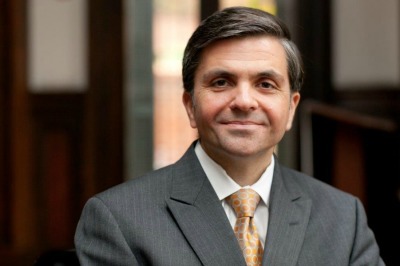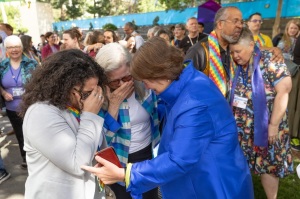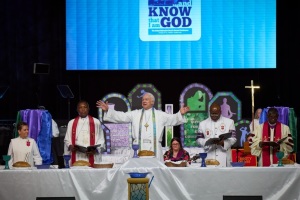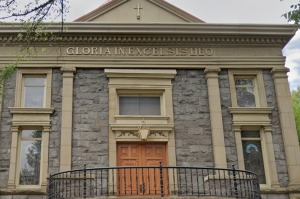Calvinist Evangelicals In a United Methodist Church!

Last evening in Washington, D.C. I was walking by an old United Methodist sanctuary and heard uncharacteristic music emanating from the windows. Curiosity drove me inside, where I was surprised to see a full congregation of almost all twenty-something's singing fulsomely as a band performed behind the altar. There being no seating left, I went upstairs to the balcony.
The congregation, of course, was not United Methodist but an Evangelical congregation tied to a Calvinist network and founded just a few years ago by a young pastor from out of town. Meanwhile, the home United Methodist congregation has virtually died off. I was glad to see the stately old sanctuary put to good use for vital worship and ministry reaching Millennials.
But I was saddened to contemplate there is no Methodist equivalent in Washington, D.C. or in most large cities. Institutional United Methodism in America has given up on cities and given up on young people, so no surprise we are declining by nearly 100,000 annually. Pockets of United Methodist vitality are typically in the suburbs.
Washington, D.C. is full of beautiful old Methodist sanctuaries that are mostly empty. Sometimes over the years I've been asked by friends where their young adult child newly arrived in the nation's capital might find a vital and orthodox United Methodist church. I've told them there really are no options. So they end up at any one of dozens of Evangelical new church plants that successfully attract young people, like the one I visited last evening.
Think about it. The most powerful city in the world has almost no vital, orthodox United Methodist churches. Instead there are typically small, liberal congregations that celebrate their diversity but have little capacity for meaningful outreach. The same is true for most large cities. And institutional United Methodism has no ability to address this challenge.
The Evangelical congregation I visited this evening describes their mission evangelistically. Their website says:
"We believe in the personal, bodily return of our Lord Jesus Christ. The coming of Christ, at a time known only to God, demands constant expectancy and, as our blessed hope, motivates the believer to godly living, sacrificial service and energetic mission."
It also says:
God's gospel requires a response that has eternal consequences. We believe that God commands everyone everywhere to believe the gospel by turning to Him in repentance and receiving the Lord Jesus Christ. We believe that God will raise the dead bodily and judge the world, assigning the unbeliever to condemnation and eternal conscious punishment and the believer to eternal blessedness and joy with the Lord in the new heaven and the new earth, to the praise of His glorious grace. Amen.
In contrast, what is the mission of diversity churches? Inclusiveness, community building, radical hospitality, affirmation, etc. One United Methodist congregation in D.C. advertises its welcome to all this way:
No matter,
- Where you've come from or are going;
- What you believe or doubt;
- What you are feeling or just not feeling;
- What you have or don't have; and
- No matter whom you love All of who you are – is welcomed into this community of faith – by a God who loves you passionately.
- Thanks be to God. Amen!
So what does that mean? And whom would it excite? All are welcome into what, for what? Most Millennials, and nearly everyone else, would respond with yawns. Hence the empty churches.
What can be done to share Methodism with young people and America's cities? By the general church or most annual conferences, nothing. Diversity ideology and bland institutionalism have crippled those bodies from any effective action.
Here's what might be done. Evangelical congregations in United Methodism might commit themselves to urban church planting. There's no reason why strong churches could not plant 100 new congregations to preach the Gospel from a Wesleyan perspective in America's largest 20 or 30 cities.
It's easy to complain about our struggling denomination. But why not focus instead on exploiting available opportunities by sending young church planting pastors into our great urban areas, starting with Washington, D.C.? The ultimate impact would not just be local but global and eternal.




























